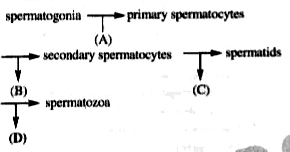What will happen if there is no reduction of chromosomes in meiosis?
Step-by-Step Solution:
1. Understanding Meiosis: Meiosis is a type of cell division that reduces the chromosome number by half. It is essential for the formation of gametes (sperm and egg cells) in sexually reproducing organisms.
2. Chromosome Reduction: During meiosis, a diploid parent cell (with two sets of chromosomes, 2n) undergoes two rounds of division (meiosis I and meiosis II) to produce four haploid daughter cells (with one set of chromosomes, n).
3. Formation of Gametes: The haploid gametes produced through meiosis are crucial for sexual reproduction. When a male gamete (sperm) and a female gamete (egg) fuse during fertilization, they form a diploid zygote (2n), restoring the original chromosome number.
4. Consequences of No Reduction: If there is no reduction of chromosomes during meiosis, the gametes would still be diploid (2n) instead of haploid (n).
5. Zygote Formation: If two diploid gametes were to fuse, the resulting zygote would have four sets of chromosomes (4n) instead of the normal two sets (2n).
6. Abnormality: This condition leads to an abnormal situation where the individual would have an excessive number of chromosomes, which can result in developmental issues and genetic abnormalities.
7. Conclusion: Therefore, the reduction of chromosomes in meiosis is critical to ensure that the resulting zygote has the correct diploid number of chromosomes, maintaining genetic stability across generations.
Topper's Solved these Questions
- CELL CYCLE AND CELL DIVISION BOOK - ICSECHAPTER - CELL CYCLE AND CELL DIVISION EXERCISE - REVIEW QUESTIONS (VERY SHORT ANSWER TYPE QUESTIONS (WITH ANSWERS))
23 Videos
- CELL CYCLE AND CELL DIVISION BOOK - ICSECHAPTER - CELL CYCLE AND CELL DIVISION EXERCISE - REVIEW QUESTIONS (LONG ANSWER TYPE QUESTIONS)
8 Videos
- CELL CYCLE AND CELL DIVISION BOOK - ICSECHAPTER - CELL CYCLE AND CELL DIVISION EXERCISE - REVIEW QUESTIONS (ANALOGY TYPE QUESTIONS)
5 Videos
- CELL : THE UNIT OF LIFE BOOK - ICSECHAPTER - CELL : THE UNIT OF LIFE EXERCISE - Differentiate Between
18 Videos
- CELLULAR RESPIRATION IN PLANTS BOOK - ICSECHAPTER - CELLULAR RESPIRATION IN PLANTS EXERCISE - REVIEW QUESTIONS ( LONG ANSWER TYPE QUESTIONS)
15 Videos
Similar Questions
Knowledge Check
The cell of endosperm have 24 chromosomes. What will be the number of chromosomes in the gametes?
A8B16C23D32
Comment on the statement - meiosis enables the conservation of specific chromosome number of each species even through the process per se results in reduction of chromosome number ?
View SolutionDuring meiosis, replication of chromosomes occurs in
View SolutionDuring meiosis, replication of chromosomes occurs in
View SolutionIn meiosis disjunction of chromosomes occurs during
View SolutionFollow this process of development and identify the exact location of reduction in chromosomal number

View SolutionWhat is a telocentric chromosome?
View SolutionThe cell of endosperm have 24 chromosomes. What will be the number of chromosomes in the gametes?
View Solution
